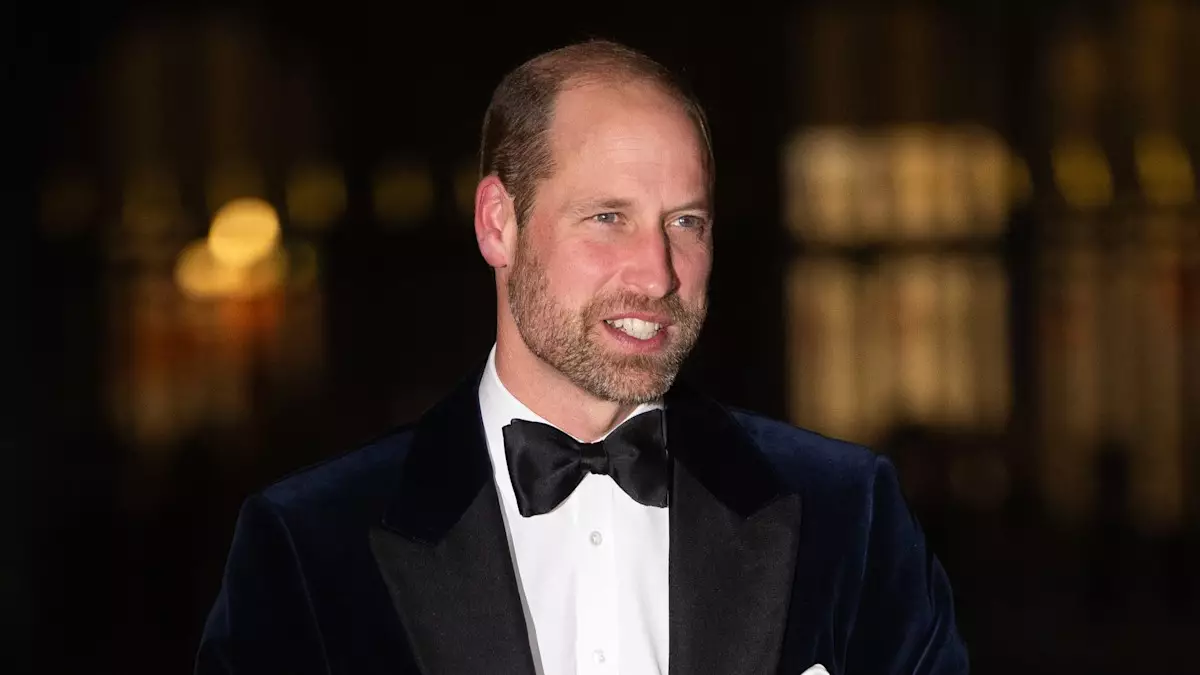Recently, at the Centrepoint Awards, Prince William, the Prince of Wales, delivered a poignant message on the urgent need for systemic reform to address the pressing issue of youth homelessness. His impassioned plea for a shift towards prevention rather than mere management highlights an essential pivot in the social approach to this critical problem. As he addressed the audience, he underscored the importance of creating genuinely affordable living options for young individuals, ensuring that they not only survive but thrive independently. This not only reflects his commitment as a long-time patron of the youth homelessness charity Centrepoint but also demonstrates the royal family’s involvements in tackling modern societal challenges.
Dressed in a distinguished dark blue velvet tuxedo, Prince William was welcomed warmly upon arrival at the prestigious event held at the British Museum. Engaging with various attendees, including young people performing during the ceremony, he set a tone of optimism and encouragement. His conversations with notable figures, such as the charity’s CEO, Seyi Obakin, and entertainment personalities, illustrated an approach that emphasizes community and collaboration in the fight against youth homelessness.
The Complexity of Homelessness
William’s assertion that “homelessness is of course a complex societal issue” signals a deep understanding of the multifaceted nature of this challenge. Youth homelessness is not just about the absence of a roof over one’s head; it is entwined with factors such as mental health, educational opportunities, employment prospects, and social support systems. Through his speech, he recognized that achieving substantive changes requires a collective effort—a movement driven by the community, organizations, and government collaboration.
The need for systemic change, as articulated by the Prince, addresses the limitations of current approaches that often react to homelessness rather than proactively seek to prevent it. Traditional methods focus predominantly on managing or mitigating the symptoms of homelessness rather than addressing its root causes. This shift in perspective is essential for creating lasting solutions that empower youth, enabling them to make meaningful strides towards independence.
During the awards ceremony, Prince William assisted in recognizing the remarkable achievements of six young individuals who have overcome considerable adversity to achieve personal growth and leadership. Presenting awards alongside other public figures, he celebrated the resilience displayed by these young recipients. This acknowledgment serves not only to honor their stories but also to inspire others facing similar struggles, demonstrating that with the right support, transformation is indeed possible.
Seyi Obakin, the CEO of Centrepoint, reinforced the importance of these awards, highlighting their role in showcasing the potential of young people when given the appropriate resources and encouragement. These nominees, many of whom have faced significant barriers, exemplify the transformative power of targeted support. Their success stories are beacons of hope and serve as the kind of narrative the public needs to rally behind to champion the end of youth homelessness.
Further emphasizing the need for community involvement, Prince William urged those inspired by the evening’s proceedings to consider their role in inducing positive change. His call to action resonated deeply, reminding attendees that collective action is crucial for dismantling the ingrained issues surrounding homelessness. The sentiment that “we will only be successful in bringing about that change if we work together” encapsulates the essence of social responsibility that must characterize our approach to this humanitarian crisis.
Shannon, a recipient of the Inspirational Award, beautifully articulated the impact of seeing notable figures like the Prince actively engaging with issues of homelessness. Her reflections not only highlight the personal journey of overcoming obstacles but also underscore the hope and aspiration that initiatives like the Homewards program—which aims to prove that homelessness can be eradicated—bring into the lives of many.
As the Prince concluded, he left the audience with a sense of responsibility and possibility. The recognition that there is “still so much more to do” creates a shared vision of hope for the future, where systemic change could effectively end youth homelessness. His commitment, joined with the enthusiasm of organizations like Centrepoint, can potentially lead to innovative solutions that specifically target the barriers young people face.
Prince William’s address at the Centrepoint Awards was more than a ceremonial speech; it was an urgent call for a reimagining of how society addresses youth homelessness. By advocating for a model of prevention and affording young people the opportunities they deserve, we can collectively foster an environment where youth are empowered to excel. The pursuit of a future free from homelessness hinges on our willingness to recognize the potential within every young individual and to act decisively to facilitate their success.

Leave a Reply